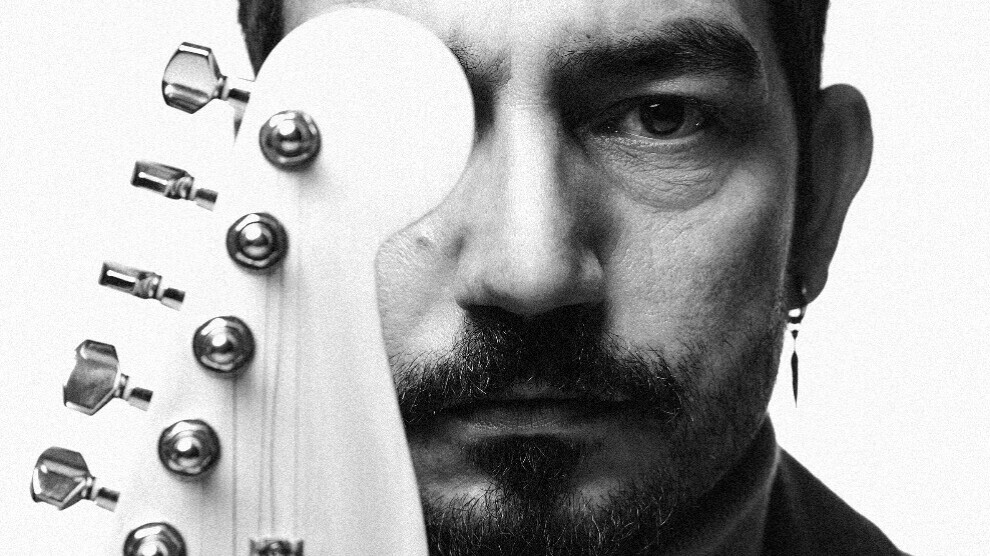Yahhya: The story of my music comes from my land and culture
Kurdish artist Yahhya published his first solo album titled Dereng.
Kurdish artist Yahhya published his first solo album titled Dereng.

Kurdish artist Yahhya has recently released his first solo album, Dereng. He said that when he named the album Dereng he did not think of the literal meaning 'to be late', but rather to metaphorical meaning, 'it is never too late for anything'.
Yahhya told ANF: "There are many unspoken words and stories from our territory, culture, people, the hopes and despairs we live in."
Why Dereng and if we consider this album just a beginning, what does it tell about you and the music you make?
As I said in previous interviews, Dereng for me does not mean being late for something, but rather, it has a metaphorical meaning. I wanted to draw attention to the fact that even when we say we are late, in fact, we are not late for anything.
Most times, we feel the need to talk to someone but we always have this fear: will we be understood or not. In addition, we can't have a conversation with everyone or we can't explain what we want to say. In this sense, music is a harbour for me to take refuge in, longing for the past, forgotten loves, learning to give up, questioning etc.
In fact, what I want to convey is left to the important listener's point of view. I told my story and what I wanted to tell, and in this case, the psychologist becomes the listener, and it is necessary to leave the diagnosis to them.
You said that your instrument was the guitar in one of your interviews. How exactly would you describe the connection you have established with the guitar and your own music?
I think that the instrument choice should be made correctly for both a soloist and someone who plays an instrument. I was not born on stage, I usually sing my songs with a solo instrument. In this respect, the guitar is the perfect fit for me. I was able to capture the harmony of traditional and modern music that I wanted to make on the guitar, with the chord presses, rhythm, arpeggio and solo playing apart from the notes.
We all experience mood and situation changes. Being a rebel when necessary, a naive man in love or a political person when necessary, in all these situations, the guitar is a good companion for me.
What feeds you while making music?
Music, for me, is a way of digesting what I feed on. I don't know if it is possible to feed on something just to make music. My method is not to feed on something while making music, but to do something with what I feed on, to share what's in my bag.
There are many unspoken words and stories in our land, culture, people, hopes and despairs in my bag.
Do you think you have established a bond with Kurdish music listeners? What is the general reaction to the album?
I cannot say whether Kurdish music listeners should listen to me for this or that reason. In the end, I think it will be the listener who will answer this in time. Before becoming a singer and a musician, I think I was a good listener. It's my first album, it's my first studio recording, but I think it's a good album, there was very good feedback.
There are songs that we can define as rock, slow and pop in the album. Do you think this diversity is good or bad?
As I said before, I was a good listener before becoming a musician. I don't want the artist I listen to to imprison me in a single mood. Sometimes one should get excited, sometimes one should rest and feel sad. Also, when I look at the comments, everyone's favourite song is different, which shows that people find something about themselves in the album.
Making music in the mother tongue is easier than it used to be, but it still faces obstacles. What do you think about this?
Everything that is easy and comfortable takes something away from you without you realizing it. It is easier to make music in the mother tongue, yes, but it has also become so much easier to lose the mother tongue, culture and tradition. Kurdish names have become widespread, but speaking Kurdish has decreased. Unfortunately, it has become easier to come across Kurds who can understand Kurdish but cannot speak it.
As for the obstacles we face, a musician, an artist, exists thanks to his audience. Unless he can meet his audience, he has difficulty performing his art. As long as there are obstacles and restrictions to meeting his audience, he cannot convey his message, which affects his morale, motivation and even his production. In the West, especially in metropolitan cities and metropolises, the venues and areas where concerts can be held are limited, it is almost impossible to make a living just by making music. Struggling for life while trying to produce something, especially in Kurdish, is a big problem for musicians.
Do you have any plans for your music career? What are your expectations?
I can't say that I like to live in a very planned and programmed way. Sometimes it is necessary to let things flow. I think I rather live according to how I feel in a specific moment. But, of course, I have words I want to say, stories to tell, and I want to do it with music.